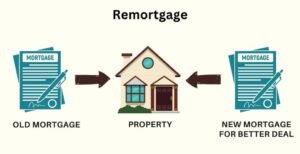
Your house isn’t just a place to live; it’s also an investment that can grow your wealth over time. The key to unlocking this potential lies in understanding ‘equity’ – the portion of your home you truly own, increasing with every mortgage payment and strategic move.
Think of equity like a progress bar. As you make your monthly payments, the bar fills up, representing your growing ownership stake. Here are some ways to supercharge that progress:
- Savvy Purchase: Buying a property below market value is a fantastic head start. Research your area, negotiate effectively, and you might land a deal that instantly boosts your equity. Didn’t manage to do that upfront? Not to worry – there are other ways you can still benefit.
- The Power of Payment: Every on-time mortgage payment (and overpayment) chips away at your loan, adding to your equity. You might even consider putting extra money towards your monthly payment if your budget allows – even a small increase can make a big difference in the long run.
- Renovation Hero: Tackling some cost-effective home improvements can significantly increase your equity. Think painting, basic landscaping, fitting a new kitchen/bathroom and replacing outdated fixtures. Remember, focus on projects that enhance functionality and curb appeal. Things that are likely to make the property much more appealing to potential buyers.
Let’s put this into action with a real-life example! Imagine you have a £250,000 mortgage remaining on your property. Through research and recent sales data, you’ve determined its current market value is £300,000. That means your current equity is £50,000 (£300,000 value – £250,000 mortgage).
The Equity Booster: Smart Renovations
Now, let’s say you decide to invest £20,000 in a strategic kitchen and bathroom renovation. Based on your research, these upgrades could increase your property’s value to £375,000. Let’s see how this impacts your equity:
- New Equity Value: £375,000 (increased value) – £250,000 (mortgage) = £125,000 equity
- Equity Increase: £125,000 (new equity) – £50,000 (old equity) = £75,000 equity gain
That’s a £75,000 equity boost! This additional equity translates to several potential opportunities:
- Remortgage and Cash Out: With increased equity, you might decide to remortgage to raise the additional gain. This allows you to access a portion of the equity as cash, which you could use for:
- Debt Consolidation: Pay off high-interest credit card debt or personal loans, potentially saving money on monthly payments.
- Home Improvement Dreams: Repay the money spent on the kitchen refurbishment and maybe even finance more improvements like that dream loft conversion or a luxurious new patio with the extra cash.
- Education Savings: Give your children a head start on university costs.
A Word on Equity Ceilings:
It’s important to remember that there’s a limit to how much equity you can build at any given time. The market value of comparable properties in your area acts as a bit of a ceiling. For instance, extensive renovations in a neighborhood dominated by modest homes might not translate to a proportionate increase in equity. Let’s revisit our previous example, but with a renovation twist!
- Scenario: Current mortgage: £250,000, Current property value: £300,000
Imagine you decide to completely transform your home with a luxurious £150,000 renovation on the kitchen, bathrooms, landscaping and more. You envision a significant equity boost!
Equity Ceiling in Action:
Fast forward, and your dream home is complete. However, upon seeking a remortgage to access some of the equity you believe has grown, you discover a key detail – similar renovated houses in your neighborhood have a maximum market value of around £375,000. So when you add your refurb spend of £150,000 to the mortgage debt of £250,000, you would need a target end value after the refurb of £400,000. But because of the market ceiling, the maximum you could value the property for based on comparables is £375,000.
The simplest way to understand it is by answering: “if I sold this property today, after paying off the mortgage, would I make a profit, loss or break even?“. In this example, you would make a loss of £25,000 (since it sold for £375,000, then from the sale, £250,000 gets paid to the mortgage company, leaving you with £125,000 – despite your spend of £150,000. And this calculation doesn’t even account for your deposit paid when you bought the property, making the loss much bigger). This is why before trying to increase your property’s value, you need to be strategic about your maximum spend.
Why the Disconnect?
Even though you’ve poured a significant £150,000 into renovations, pushing your total investment well beyond the average for your area, the overall market dictates the upper limit of what buyers are willing to pay. In this scenario, a remortgage valuation might not reflect the full value you were hoping for, despite the impressive renovations.
The Market Says No to Over-Improvement
While your renovations might be stunning, the market might not appreciate them to the same extent. Buyers compare similar properties, and if yours significantly exceeds the norm in terms of investment, it might not translate to a proportionate increase in value. This is why buying the property below market value in the first place can be such an advantageous move to give you more room to play with from the start.
Here’s how to stay grounded:
- Do Your Research: Before embarking on major renovations, research recent sales data in your neighbourhood. This will help you understand the ballpark value of similar properties after renovation and avoid over-improving.
- Seek Expert Advice: Consulting with several selling agents and doing extensive research on sold prices for similar properties to different specification levels nearby can provide valuable insights into the potential return on investment (ROI) for specific home improvement projects.
Need help or want support figuring out your equity situation? Get in touch and we’ll help advise you on what your options are and what you need to watch out for too. We can help you calculate your current equity, explore ways to maximise its growth, and even guide you through the remortgage process if you decide to leverage your built-up equity for future endeavours.
Remember, building equity is a smart and rewarding journey. By making informed decisions, prioritising strategic improvements, and staying mindful of market realities, you can transform your home into a wealth-building asset!






